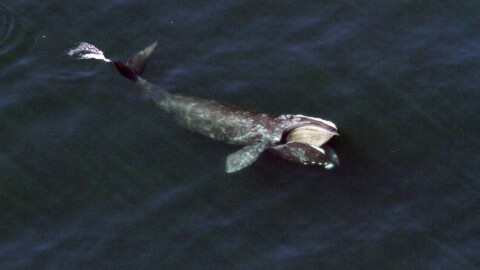Lobstermen and conservationists are awaiting a high-stakes court decision on a plan to bar lobster trap-rope from a nearly 1,000-square mile area off Maine's coast.
The federal restriction is set to go into effect on Monday, and last through the end of January. It's the first in a series of new federal gear rules aimed at reducing the risk that North Atlantic right whales will be entangled with trap rope and gear.
But the Maine Lobstering Union says the restricted zone's layout and timing were based on flawed models and lacked sufficient real-world observations — such as aerial surveys — to prove the whales are in fact swimming there. In an online court hearing this morning, a union lawyer argued that its members and associated businesses could lose tens of millions of dollars.
"The government wants to shut down grounds to protect a species that isn't even there," said Portland lawyer Alfred Frawley. "Forcing the agency to gather data and engage in responsible rule-making is in the whales' interest, the fishermen's interest and the public interest."
The union called for a temporary injunction against the restriction zone, to prevent irreparable harm to the industry while the case moves forward.
Some of Judge Lance Walker's comments from the bench indicated concern about the government's statistical modeling.
"Is there anything else the agency could have done, as seems to be suggested by plaintiffs, to confirm what the agency's fairly abstract prediction models regarding aggregation of right whales seem to suggest?" he asked.
Attorneys for the National Oceanic and Atmospheric Administration and conservation groups argued that there is ample and recent evidence, including real-world acoustic detections, that the whales do swim in the disputed waters about 30 miles off the coast.
They say that with fewer than 370 of the animals left on the planet, and the likelihood that whales will encounter strong rope used by big open-sea trawlers, the restriction zone is necessary to stop the slide toward extinction.
Erica Fuller, a lawyer with the Conservation Law Foundation, says that the roughly 120 boats that fish in or near the restriction zone will be able to find viable territory nearby.
"In contrast we're talking about the extinction of a species that is a national priority and of interest to the public in every state on the Atlantic seaboard and across the country," Fuller said. "Their arguments boil down to competing views on policy and science on which this court must defer to the agency, And in any event, plaintiffs' harms simply can not outweigh the incalculable value of measure to protect critically imperiled right whales."
Judge Walker closed the hearing after three hours, saying he would issue a decision "very soon."



